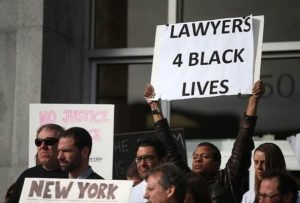
Protesters hold signs during a “Hands Up, Don’t Shoot” demonstration in front of the San Francisco Hall of Justice on December 18, 2014 in San Francisco, California to protest the racial disparities in the criminal justice system. Photo by Justin Sullivan / Getty Images
Earlier this year, San Francisco public defender Mark Jacobs posed an interesting question to a group of potential jurors for the trial of a young Black man convicted of murder. According to the Marshall Project, Jacobs turned to the jurors and asked that they acknowledge whether they might judge his client more harshly because of the color of his skin.
“Look at my client,” Jacobs said, pointing out the young man’s dark skin. “He’s the stereotype of everything you think is scary.”
Jacob’s shocking yet realistic question indicates an increasing awareness among public defenders that they too may harbor racial and ethnic biases about Blacks. Such biases are usually attributed to the police, judges and prosecutors.
The Marshall Project reports that researchers have tried to draw connections between implicit bias and racial disparities that occur at different stages of the U.S. criminal justice system. A study conducted by Yale Law School testing racial discrimination in bail settings found that African-American defendants in Connecticut received bail amounts that were 25 percent higher than their white counterparts. Another study, done by the University of Georgia, examined racial, ethnic and gender incongruities in criminal sentencing and concluded that Blacks sentenced in federal courts received terms that were 12 percent longer.
A great deal of the research focuses on prosecutors, jurors and judges — the trio that ultimately sends people to jail. Researchers are now looking into how racial bias may affect the work of public defenders and the amount of time they spend with their African-American clients.
“I figured: we understand racism, we know our clients, we get it,” says Jeff Adachi, San Francisco’s elected public defender.
Adachi pioneered the grass-roots organization Public Defenders for Racial Justice in hopes of bringing issues concerning racial inequality in the courts to the forefront, KQED News reports. Over 100 public defenders turned out for the group’s first meeting at UC Berkley in June 2015.
“There’s this whole national debate going on across the country: Is America suffering from racism?” Adachi said in an interview with KQED. “Part of what we need to do as public defenders is to get people talking about it.”
Per the Marshall Project, Adachi now runs bi-annual, all-day meetings with members of his staff to address how automatic biases can sometimes slip into their work. He also explained that there’s an actual test that measures human bias.
“They have you look at images that flash on the screen very quickly, and you use your computer keyboard to make certain choices: Good, bad, positive or negative,” Adachi said. “And what it shows is that most people are going to make judgment calls against African-Americans and in favor of white Americans.”
Public defender Jacobs says the discovery of research that linked skin tone and the harshness of sentences made him sick and recalls a time when he was appointed to defend immigrants.
“I’d think, well this case isn’t as important as that of an American kid,” he admitted. “It was a feeling of, they’re just going to plead guilty so why should I bother?”
William Missouri, a retired African-American circuit court judge from Maryland, also had a chance to review his own sentencing patterns. What he discovered was alarming: He had displayed biased against his own race.
“Being accused of bias is like a knife slicing your skin; the cut may be shallow, but the hurt is deep,” Missouri said.
Phoebe Haddon, chancellor of Rutgers-University Camden suggests that racial bias has the potential to affect whether a defender believes his/her client’s claim of innocence or guilt. She says bias can also manifest in “…their assessment of their fellow counsel, the credibility of witnesses, and whether to take a plea bargain.”
The data collected so far is meager but many public defenders believe that “implicit bias” is often exacerbated by how much time they devote to cases. According to a 2013 article written for the Yale Law Journal by professors Song Richardson and Philip Atiba Goff, the submission to implicit bias is often worsened by stress, exhaustion and speed — “exactly the context in which public defenders find themselves.” Richardson and Goff also suggest that defenders may spend more time on a case when they feel their client is “factually innocent.”
Per the Marshall Project, research on the subject is mostly theoretical and solid claims are still vague. The non-profit publication also reports that videos and other supplemental materials encouraging defenders and prosecutors to slow down with their work and do more self-examination is scheduled for release by the American Bar Association later this year.